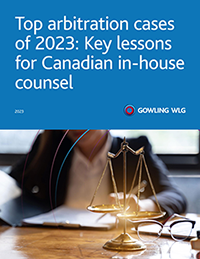 Download full PDF
Download full PDF
Introduction
Arbitration continues to prove a popular form of dispute resolution across Canada for a variety of disputes. While arbitration has numerous benefits compared to court litigation, a key advantage, especially in Canada, continues to be the relative speed and efficiency of the process compared to litigation.
The Advocates’ Society has highlighted “the endemic delays plaguing the delivery of civil and family justice across Canada” in the court system. It also noted that “this crisis pre-dates the COVID-19 pandemic, but was also exacerbated by it.” Indeed, the lengthy waits for motion hearings (over a year in Toronto for a two-hour motion, for example) and trial dates are now putting access to timely justice at risk. Only time will tell whether current remedial steps will prove effective, or whether the current timeframes for litigation are now the “new normal.”
However, arbitration is not a panacea. As the cases in this publication show, occasionally parties will still seek the assistance of the courts, whether to make orders in support of the arbitration or to exercise their supervisory jurisdiction over arbitrations taking place in their jurisdictions. The circumstances in which the courts should exercise their supervisory jurisdiction are set out in statute, but the interpretation and application of those rules, and where the limits lie, are a matter of considerable judicial (and practitioner) interpretation and debate.
Even within the arbitration community, there is considerable debate and disagreement as to where the limits of court supervision should be and how interventionist we want the courts to act. Too little supervision and arbitration becomes a law unto itself with risks of miscarriages of justice; too much intervention risks offending the parties’ choice to arbitrate in the first place.
The risks of the former were highlighted starkly in the recent English case of Nigeria v Process & Industrial Developments Limited (P&ID). In this case, a US$11-billion award handed down by a highly esteemed tribunal (including a former UK Supreme Court judge) was set aside due to fraud, bribery and unconscionable behaviour by P&ID’s lawyers (including obtaining Nigeria’s privileged materials). However, generally speaking, arbitration users won’t want immaterial procedural decisions to potentially jeopardize an award. Successful parties should not face proceedings where the arbitral award’s merits are re-litigated before a court (absent an agreed upon right of appeal), nor wait years to enforce an award due to spurious applications to set aside the award.
Some litigants have not helped the courts, cloaking merits appeals as thinly disguised applications to set aside an award on jurisdictional grounds or due to a lack of procedural fairness, all to get around an award’s finality. That in turn has led the courts to, often correctly, treat such applications with circumspection. At the same time, perhaps unfairly, there can be an unjustified reluctance to find genuine circumstances to set aside an award. This is possibly due to concern about encouraging unmeritorious applications, and possibly due to the need to be seen to be “arbitration-friendly” by upholding awards. However, as the P&ID case shows, supporting arbitration as a robust and fair dispute resolution process equally requires the court not only to abstain from intervening where it is unnecessary, but to step in where the circumstances warrant it to preserve the integrity of the process.
However, one side’s procedural discretion will be another side’s fundamental procedural unfairness. Where the fine line is drawn is a careful balancing exercise. It is one that practitioners will continue to argue about (and that courts will continue to grapple with) for a long time to come, maybe even longer than the time it takes to obtain a trial date before a Canadian court.
Index of cases